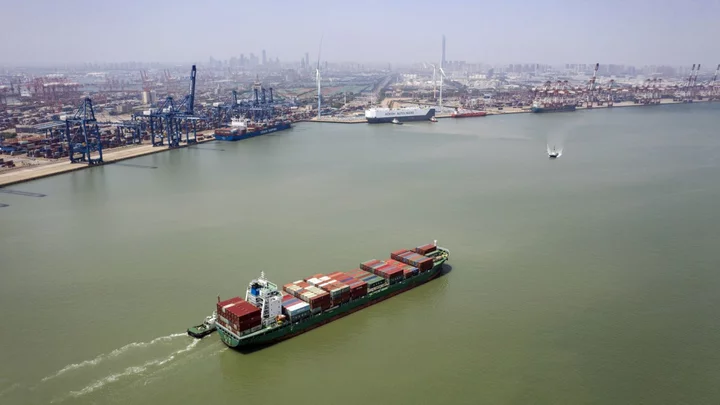The drop in China’s exports moderated further in September, adding to cautious optimism that some parts of the world’s second-biggest economy are stabilizing.
Overseas shipments fell 6.2% from a year ago to $299 billion, a slower rate than the 8% decline forecast by economists in a Bloomberg survey. Imports decreased 6.2%, down for seven months in a row. The resulting trade surplus was $77.7 billion.
The numbers reflect improved global demand for Chinese-made goods even as geopolitical tensions are building. The economy still faces myriad challenges including a property crisis and weak consumer spending. Consumer prices also returned to the brink of deflation in September, underscoring how fragile the economy remains.
The upside surprise of trade data shows some short-term stabilization in the Chinese economy, according to Raymond Yeung, chief China economist at Australia and New Zealand Banking Group Ltd . However, “China is still slowing down structurally” and the spike in the trade data will be short-lived, he said.
Exports to most major markets continued to fall, with shipments to the European Union down almost 12%, those to Asean falling almost 16% and exports to the US, Japan, South Korea and Taiwan dropping. Imports from major commodity suppliers such as Australia, Brazil and Russia rose, while purchases from the US, Japan and South Korea fell.
Read More: China’s Commodities Imports Stay Buoyant as Economy Revives
While support rolled out by policymakers in the last few months has aided growth somewhat, concerns remain about whether more may be needed to bolster the outlook. Authorities are considering unleashing new stimulus to help the economy meet the official growth target of around 5%, Bloomberg News reported this month.
What Bloomberg Economics Says...
“Inbound shipments running well below year-earlier levels — even as higher oil prices inflated the import bill — is a clear sign of anemic demand. One positive in the trade data — export declines narrowed, suggesting a lighter drag from external demand.”
— David Qu, economist
Read the full report here.
The International Monetary Fund recently cut its growth forecast for China for this year to 5% from 5.2%, and for next year to 4.2% from 4.5%. The economy is losing momentum because of declines in real estate investment and housing prices that endanger government revenues from land sales, as well as weak consumer sentiment, according to the Fund.
Additional data next week will also provide more clues on the state of the economy in the third quarter, including gross domestic product figures and indicators on retail sales, industrial output and unemployment.
--With assistance from Tomoko Sato.
(Updates throughout.)

